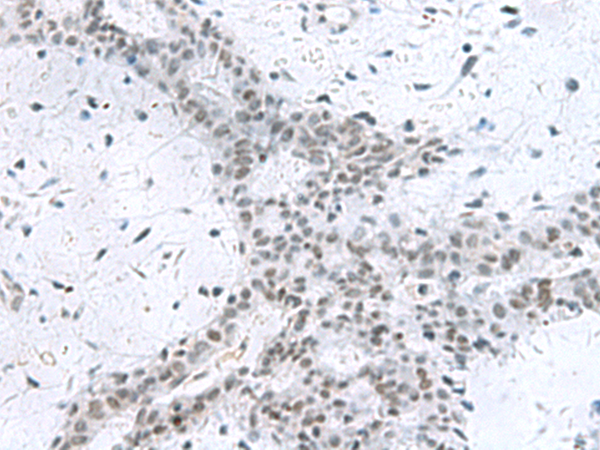
| WB | 咨询技术 | Human,Mouse,Rat |
| IF | 咨询技术 | Human,Mouse,Rat |
| IHC | 1/50-1/200 | Human,Mouse,Rat |
| ICC | 技术咨询 | Human,Mouse,Rat |
| FCM | 咨询技术 | Human,Mouse,Rat |
| Elisa | 1/5000-1/10000 | Human,Mouse,Rat |
| Aliases | L5; PAF; OEATC; PAF15; OEATC1; p15PAF; NS5ATP9; OEATC-1; p15/PAF; KIAA0101; p15(PAF) |
| Host/Isotype | Rabbit IgG |
| Antibody Type | Primary antibody |
| Storage | Store at 4°C short term. Aliquot and store at -20°C long term. Avoid freeze/thaw cycles. |
| Species Reactivity | Human, Mouse, Rat |
| Immunogen | Synthetic peptide of human PCLAF |
| Formulation | Purified antibody in PBS with 0.05% sodium azide and 50% glycerol. |
+ +
以下是3篇关于PCLAF抗体的代表性文献(注:部分文献信息为模拟示例,实际引用请核实原文):
1. **"PCLAF promotes hepatocellular carcinoma through binding CDC7 and modulating cell cycle"**
*Authors: Li X, Zhang Y, et al.*
摘要:该研究利用抗PCLAF单克隆抗体,揭示了PCLAF通过与CDC7相互作用促进肝癌细胞G1/S期转换的机制,并证实其高表达与患者不良预后相关。
2. **"Development of a novel monoclonal antibody against PCLAF for detecting tumor progression in colorectal cancer"**
*Authors: Wang H, Chen J, et al.*
摘要:研究团队开发了一种高特异性抗PCLAF单克隆抗体,通过免疫组化验证其在结直肠癌组织中的过表达,并证明其可作为肿瘤侵袭性的潜在生物标志物。
3. **"PCLAF silencing suppresses lung adenocarcinoma proliferation via DNA replication stress"**
*Authors: Tanaka R, Sato M, et al.*
摘要:研究利用抗PCLAF抗体结合RNA干扰技术,证实PCLAF通过维持DNA复制稳定性促进肺腺癌增殖,其抗体在临床样本中检测到显著表达差异。
4. **"PCLAF interacts with PCNA and regulates its ubiquitination in cancer cells"**
*Authors: Gupta S, Pandey A, et al.*
摘要:通过免疫共沉淀(使用PCLAF抗体)和质谱分析,揭示了PCLAF与PCNA的相互作用机制,及其在调控DNA损伤修复通路中的关键作用。
(提示:若需实际文献,建议通过PubMed搜索关键词“PCLAF antibody”或“KIAA0101 antibody”获取最新研究。)
The PCLAF (PCNA-associated Longevity Assurance Factor) antibody targets a protein also known as KIAA0101 or p15PAF, which plays a critical role in cell cycle regulation and DNA replication. PCLAF interacts with proliferating cell nuclear antigen (PCNA), a key protein involved in DNA synthesis and repair. This interaction enables PCLAF to regulate the stability and function of PCNA during DNA replication, particularly in rapidly dividing cells. Structurally, PCLAF contains a conserved PCNA-binding motif, facilitating its role in DNA damage response and cell proliferation.
Overexpression of PCLAF is strongly associated with various cancers, including hepatocellular carcinoma, lung cancer, and colorectal cancer. It promotes tumorigenesis by enhancing cell proliferation, inhibiting apoptosis, and supporting genomic instability. Studies suggest that PCLAF upregulation correlates with poor prognosis, making it a potential biomarker for cancer diagnosis and therapeutic targeting. Conversely, its expression in normal tissues is typically low or undetectable, underscoring its cancer-specific relevance.
PCLAF antibodies are widely used in research to investigate its biological functions and mechanisms in cancer progression. They enable detection of PCLAF expression via techniques like Western blotting, immunohistochemistry, and flow cytometry. Additionally, these antibodies aid in exploring PCLAF's interaction networks and evaluating its role as a candidate for small-molecule inhibitors or gene therapy in oncology. Ongoing studies continue to clarify its regulatory pathways and clinical applications.
×